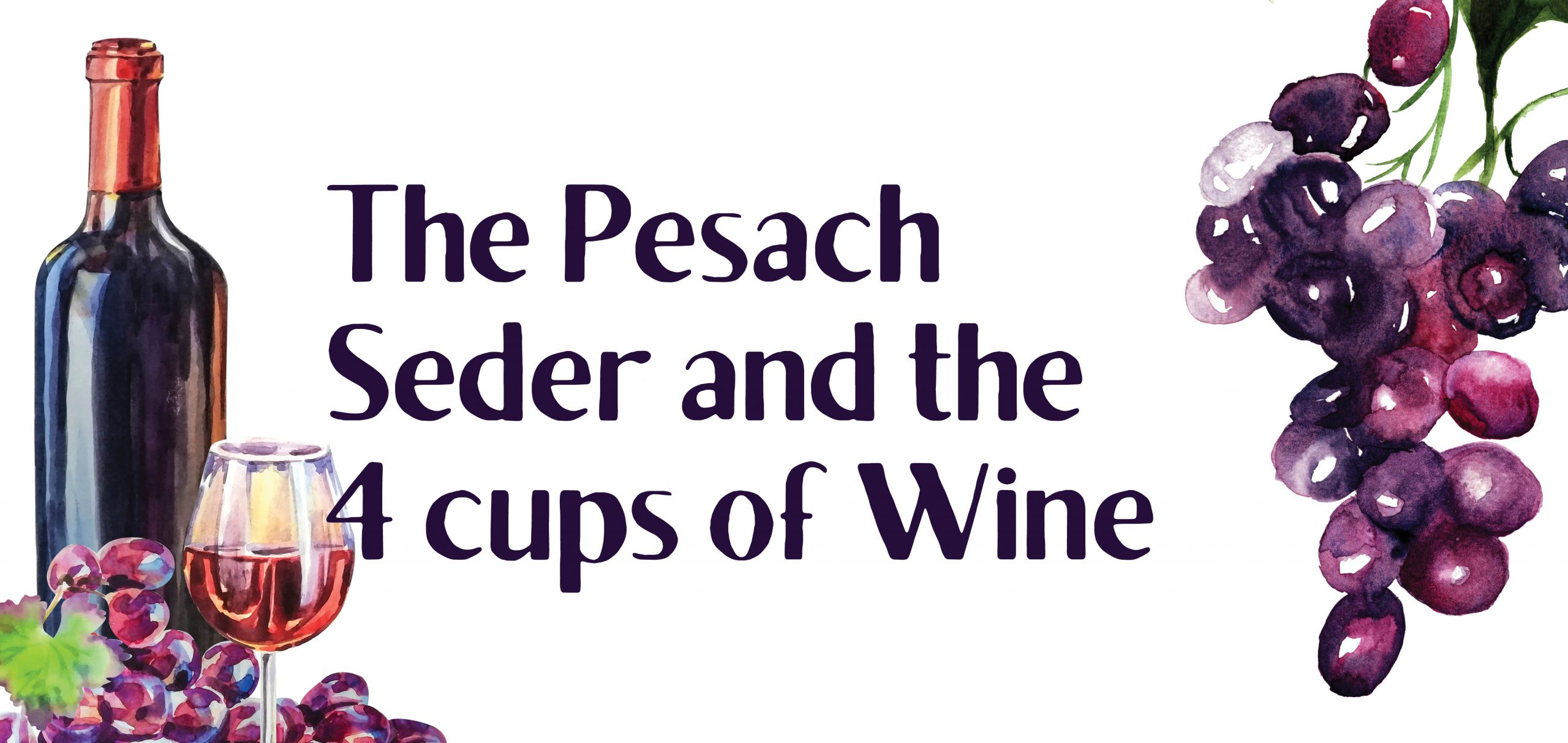Pesach is called Z’man Cheruseinu (Time of our Freedom) in honor of our redemption from slavery in Mitzrayim and our rebirth as B’nei Yisroel. One of the most significant customs at the Pesach Seder is the four cups of wine, consumed by men, women and children, representing the four words of redemption that were said in Parshas Va’eira: V’hotzeiti (I will take you out), V’hitzalti (I will save you), V’ga’alti (I will redeem you), and V’lakachti (I will take you).
The four cups of wine are drunk while reciting praises for Hashem1 and reclining towards the left side, a symbol of freedom and luxury, to remind us of the miraculous Exodus from Mitzrayim.
Many have the minhag to drink red wine during the Pesach Seder to remind us of the blood of the Jewish children who were murdered by Pharaoh during the years of enslavement, but during times of blood libels where Jews were accused of using the blood of non-Jewish children in the matzah and wine, the custom of using red wine at the Seder was not observed.
On the Seder night we have the custom to invite guests to join our Seder, in fulfillment of the words of the Haggadah: “Kol dichfin yeisei v’yeichol. Let all who are hungry come and eat.” Sometimes the guests are not Torah observant, and other times there are non-Jewish staff present, either waiters, housekeepers, attendants for the elderly, etc. Due to the special status of wine in Halacha, the kosher status involves a lot more than just kosher ingredients and kosher production equipment. Wine, even when produced by a frum Jew under mehadrin kosher supervision, can only be touched by a frum Jew in order to retain its kosher status, unless the wine (or grape juice) is mevushal (cooked)2. When non-Jewish or non-observant guests are present, it is best to use mevushal wine.
Why is uncooked wine that is touched by a non-Jew or non-observant Jew, prohibited? The main reason is Yayin Nesech3 (avodah zara), and a secondary reason is to prevent assimilation and intermarriage, so why does cooking the wine help?
The Rosh explains that cooked wine was very uncommon so it was not prohibited. The Rambam, however, gave a different reason. He said that only uncooked wine could be offered at the Bais HaMikdash and only uncooked wine was offered to idols by non-Jews, so cooked wine was not prohibited because it could not be used for sacrifices or idol worship. There is another opinion that cooked wine cannot become prohibited because the taste changes when it is cooked and it cannot be aged for prolonged amounts of time.
Those that hold by an opinion that cooked wine has a different taste from uncooked wine may also adhere to a minority opinion that cooked wine cannot be used for kiddush and actually requires the brocha of shehakol4!
Those who abide by this opinion do not use mevushal wine for the Seder and will pour the wine for their guests to avoid anyone touching the bottle. If a non-observant Jew, generally considered a tinok shenishba (one who was never taught), touches his own glass of uncooked wine, he is permitted to drink the wine, especially at the Seder which is a mitzvah to observe and might lead him towards teshuvah.
There is an additional stringency, as brought down by the Shelah in the name of Taamei HaMitzvos, that some people are stringent not to drink wine that has been seen by a non-Jew, even though the wine was not actually touched by a non-Jew, because the non-Jew saw the wine, or smelled it, and desires it. Since the general thoughts of the non-Jews at that time were directed towards idol worship, it became forbidden. The Shelah adds that whoever avoids such wine will merit to have the “aged wine”, referring to the wine when Moshiach comes. Of those who are stringent about this, some are only stringent with wine meant for Kiddush, Havdalah or the Four Cups at the Seder.
Two years ago, on Acharon Shel Pesach, Rabbi Don Yoel Levy OB”M, Kashrus Administrator of OK Kosher Certification, passed away. He was niftar during the time of Seudas Moshiach, when Chassidism drink four cups of wine to remember and strengthen the belief in the upcoming redemption. Rabbi Levy was dedicated to upholding the highest standards of kashrus around the world. His clarity of mind and Halachic instructions on every subject are dearly missed in the world of kashrus and we are constantly praying and hoping for the fulfillment of the techiyas hameisim and the Final Redemption when we will taste the aged wine of Moshiach and the whole Jewish people will return to Yerushalayim.
1. Gemara, Tosafos, Pesachim 106.
2. Gemara, Avodah Zara 30.
3. See kosherspirit.com for a lengthy discussion.
4. The reasoning is beyond the scope of this article.
Rabbi Weinfeld is a member of the OK Kosher Vaad HaKashrus.


 EN
EN  ZH
ZH  KR
KR  BR
BR  ES
ES  IN
IN  IL
IL 




